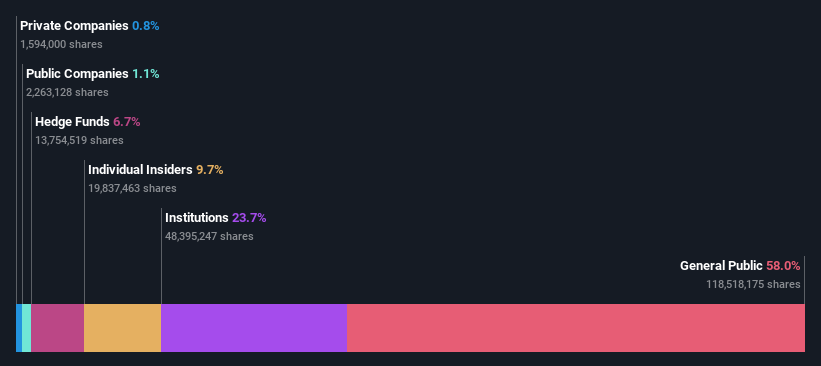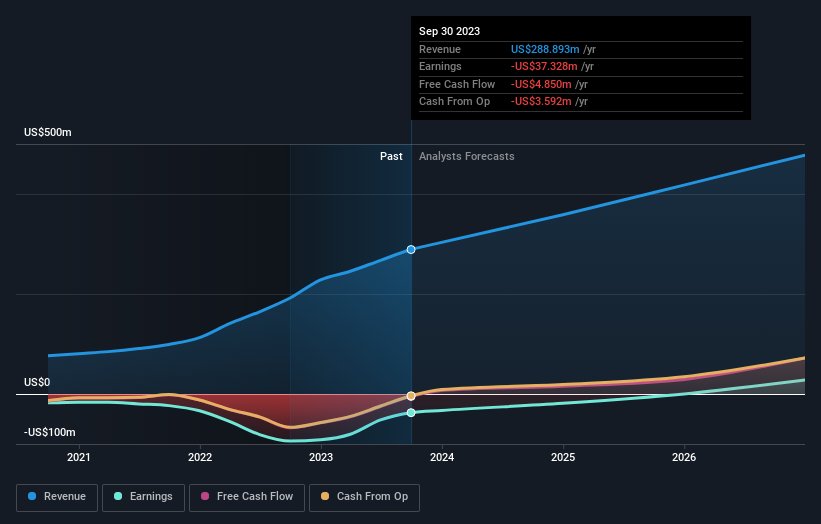Key Insights
-
Significant control over Life360 by individual investors implies that the general public has more power to influence management and governance-related decisions
-
42% of the business is held by the top 25 shareholders
A look at the shareholders of Life360, Inc. (ASX:360) can tell us which group is most powerful. And the group that holds the biggest piece of the pie are individual investors with 58% ownership. Put another way, the group faces the maximum upside potential (or downside risk).
And institutions on the other hand have a 24% ownership in the company. Institutions often own shares in more established companies, while it’s not unusual to see insiders own a fair bit of smaller companies.
In the chart below, we zoom in on the different ownership groups of Life360.
See our latest analysis for Life360
What Does The Institutional Ownership Tell Us About Life360?
Institutions typically measure themselves against a benchmark when reporting to their own investors, so they often become more enthusiastic about a stock once it’s included in a major index. We would expect most companies to have some institutions on the register, especially if they are growing.
Life360 already has institutions on the share registry. Indeed, they own a respectable stake in the company. This suggests some credibility amongst professional investors. But we can’t rely on that fact alone since institutions make bad investments sometimes, just like everyone does. If multiple institutions change their view on a stock at the same time, you could see the share price drop fast. It’s therefore worth looking at Life360’s earnings history below. Of course, the future is what really matters.
It would appear that 6.7% of Life360 shares are controlled by hedge funds. That catches my attention because hedge funds sometimes try to influence management, or bring about changes that will create near term value for shareholders. Paradice Investment Management Pty Ltd. is currently the largest shareholder, with 7.3% of shares outstanding. With 6.7% and 4.9% of the shares outstanding respectively, Regal Partners Limited and Challenger Limited are the second and third largest shareholders. In addition, we found that Christopher Hulls, the CEO has 3.1% of the shares allocated to their name.
A deeper look at our ownership data shows that the top 25 shareholders collectively hold less than half of the register, suggesting a large group of small holders where no single shareholder has a majority.
Researching institutional ownership is a good way to gauge and filter a stock’s expected performance. The same can be achieved by studying analyst sentiments. There are plenty of analysts covering the stock, so it might be worth seeing what they are forecasting, too.
Insider Ownership Of Life360
The definition of an insider can differ slightly between different countries, but members of the board of directors always count. Management ultimately answers to the board. However, it is not uncommon for managers to be executive board members, especially if they are a founder or the CEO.
Most consider insider ownership a positive because it can indicate the board is well aligned with other shareholders. However, on some occasions too much power is concentrated within this group.
We can see that insiders own shares in Life360, Inc.. It is a pretty big company, so it is generally a positive to see some potentially meaningful alignment. In this case, they own around AU$148m worth of shares (at current prices). Most would say this shows alignment of interests between shareholders and the board. Still, it might be worth checking if those insiders have been selling.
General Public Ownership
The general public — including retail investors — own 58% of Life360. With this amount of ownership, retail investors can collectively play a role in decisions that affect shareholder returns, such as dividend policies and the appointment of directors. They can also exercise the power to vote on acquisitions or mergers that may not improve profitability.
Next Steps:
I find it very interesting to look at who exactly owns a company. But to truly gain insight, we need to consider other information, too. For instance, we’ve identified 1 warning sign for Life360 that you should be aware of.
If you would prefer discover what analysts are predicting in terms of future growth, do not miss this free report on analyst forecasts.
NB: Figures in this article are calculated using data from the last twelve months, which refer to the 12-month period ending on the last date of the month the financial statement is dated. This may not be consistent with full year annual report figures.
Have feedback on this article? Concerned about the content? Get in touch with us directly. Alternatively, email editorial-team (at) simplywallst.com.
This article by Simply Wall St is general in nature. We provide commentary based on historical data and analyst forecasts only using an unbiased methodology and our articles are not intended to be financial advice. It does not constitute a recommendation to buy or sell any stock, and does not take account of your objectives, or your financial situation. We aim to bring you long-term focused analysis driven by fundamental data. Note that our analysis may not factor in the latest price-sensitive company announcements or qualitative material. Simply Wall St has no position in any stocks mentioned.









